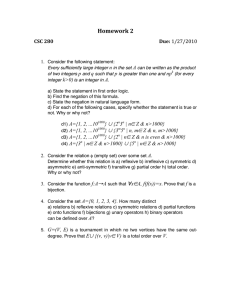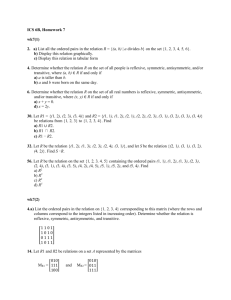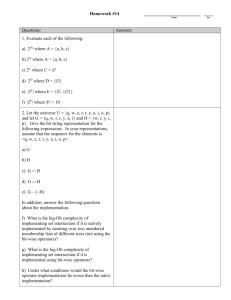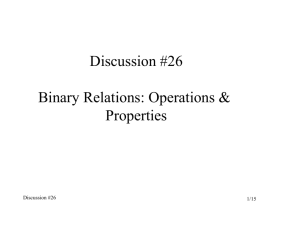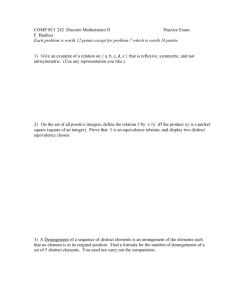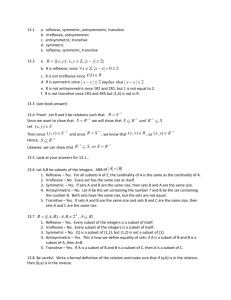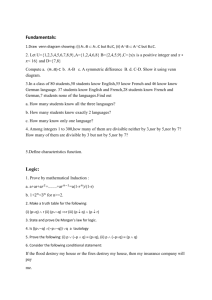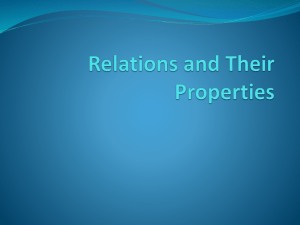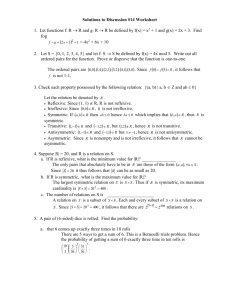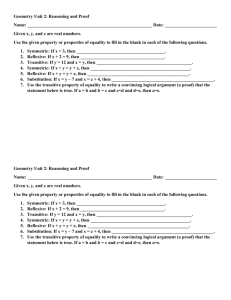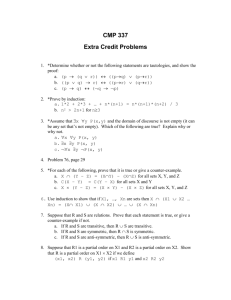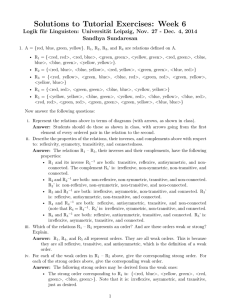1) Consider the following relation R defined over the set of positive
advertisement
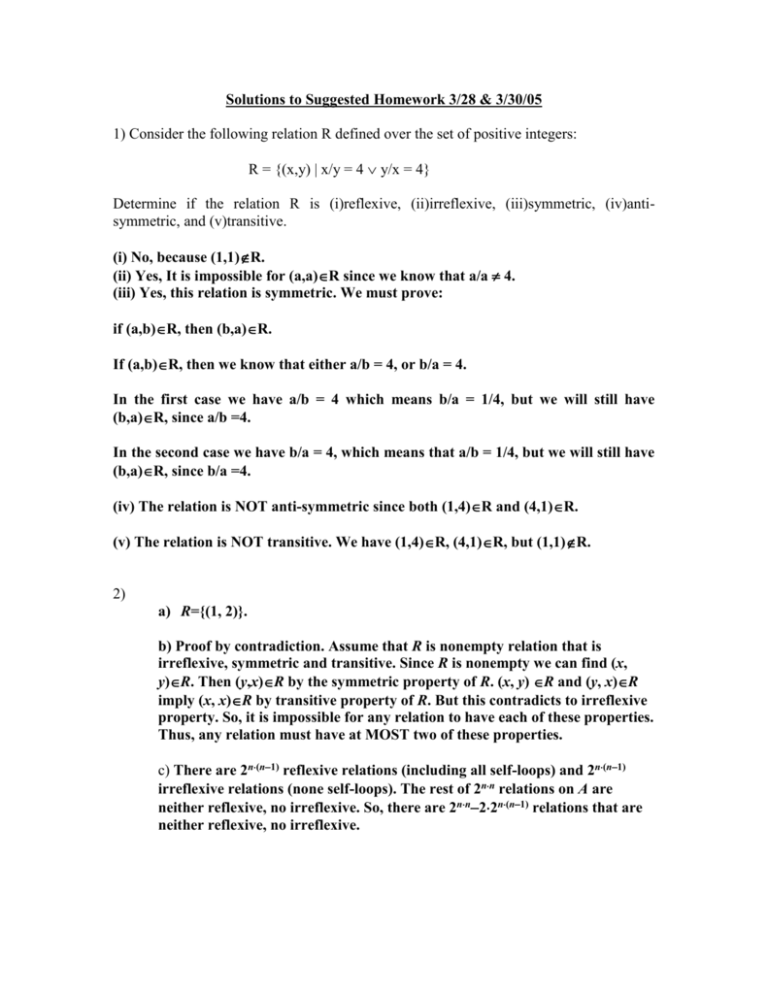
Solutions to Suggested Homework 3/28 & 3/30/05
1) Consider the following relation R defined over the set of positive integers:
R = {(x,y) | x/y = 4 y/x = 4}
Determine if the relation R is (i)reflexive, (ii)irreflexive, (iii)symmetric, (iv)antisymmetric, and (v)transitive.
(i) No, because (1,1)R.
(ii) Yes, It is impossible for (a,a)R since we know that a/a 4.
(iii) Yes, this relation is symmetric. We must prove:
if (a,b)R, then (b,a)R.
If (a,b)R, then we know that either a/b = 4, or b/a = 4.
In the first case we have a/b = 4 which means b/a = 1/4, but we will still have
(b,a)R, since a/b =4.
In the second case we have b/a = 4, which means that a/b = 1/4, but we will still have
(b,a)R, since b/a =4.
(iv) The relation is NOT anti-symmetric since both (1,4)R and (4,1)R.
(v) The relation is NOT transitive. We have (1,4)R, (4,1)R, but (1,1)R.
2)
a) R={(1, 2)}.
b) Proof by contradiction. Assume that R is nonempty relation that is
irreflexive, symmetric and transitive. Since R is nonempty we can find (x,
y)R. Then (y,x)R by the symmetric property of R. (x, y) R and (y, x)R
imply (x, x)R by transitive property of R. But this contradicts to irreflexive
property. So, it is impossible for any relation to have each of these properties.
Thus, any relation must have at MOST two of these properties.
c) There are 2n(n1) reflexive relations (including all self-loops) and 2n(n1)
irreflexive relations (none self-loops). The rest of 2nn relations on A are
neither reflexive, no irreflexive. So, there are 2nn22n(n1) relations that are
neither reflexive, no irreflexive.
3) a) R = {(2,6), (6,2), (4,8), (8,4), (6,10), (10,6)}
b)R is not reflexive because (2,2)R.
R IS irreflexive because for all a, (a,a)R. To show this, note that |a-a| = 0, not 4.
R IS symmetric because if |a-b| = 4, |b-a|=4.
R is not antisymmetric because (2,6) and (6,2) are elements in R.
R is not transitive because (2,6) and (6,2) are in R but (2,2) is not.
4)
a) Each of these relations must contain the eight elements (1,1), (2,2), ... (8,8). All of
the possible 56 elements are free to either be chosen or not chosen in the relation.
Using the multiplication principle, we have the number of possible reflexive
relations equalling 256.
b) Group the possible elements of R into 36 groups. For each ordered pair of the
form (a,b) with ab, group (a,b) with (b,a). This gives rise to 28 groups. The last 8
groups will each contain one element: either (1,1), (2,2), (3, 3), etc. or (8,8). For each
possible symmetric relation, you are either free to choose the contents of a group or
not in the relation. Using the multiplication principle, there are 236 ways to do this.
c) Using the logic from above, we don't have the choice with 8 of the groups, so our
count would now be 228, for the 28 groups we are free to choose or not choose.
d) Here we have one less free choice than in part a. So, the answer is 255.
e) Here we have one less free choice of groups than in part b. So, the anwer is 235.
f) Use the same groupings as in part b. But now, for each of the 8 single element
groupings, we can either choose the value or not. But for the other 28 groupings, we
have three choices: choose none, the first element, or the second element. The only
choice we can't make is both. So we have 8 options of 2 choices each, and 28 options
of 3 options each. Using the multiplication principle, we have a total of 2 8328 antisymmetric relations.
g) Since the relation contains (1,2), that is the only option from that one group we
can exercise. All other remaining options are unaffected. Thus, we have a total of
28327 anti-symmetric relations containing {1,2).
h) Use the same groups as part b. Only one choice is viable from each of the 28
groups with two elements. (This is not choosing either element.) Thus, we are left
with our 8 elements each of which can be in or out of the relation. This is a total of
28 possible relations.
i) Just one =) {(1,1), (2,2), (3,3), (4,4), (5,5), (6,6), (7,7), and (8,8)}
